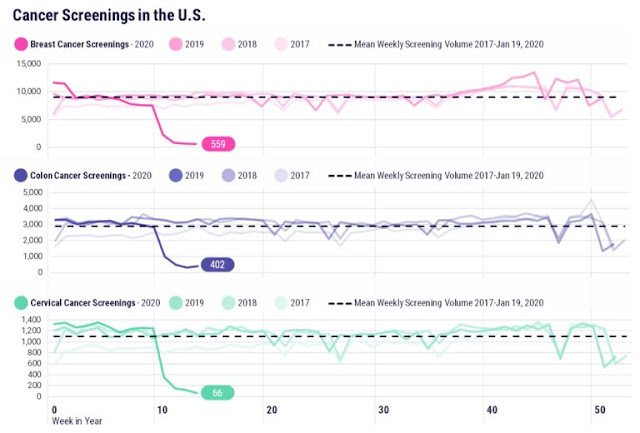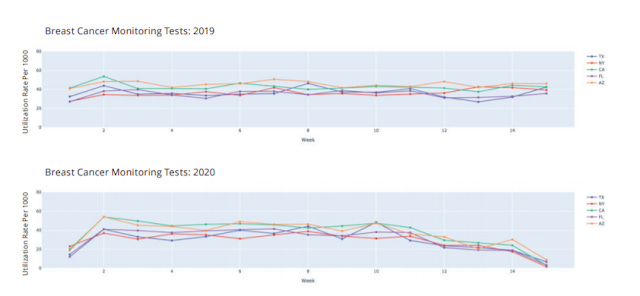"Massive Demand Collapse." Why medical costs will decline this year, and maybe next!
Today's Managing Health Care Costs Number is 94%
When the COVID-19 pandemic began, I thought that medical costs would skyrocket. The increased costs would be a bit constrained by the total number of intensive care beds or ventilators-but I thought costs would definitely go up.
I was wrong, on many counts. I overestimated how many Americans would be infected in the first wave of COVID-19, and I underestimated how much non-COVID care would not happen. I WAY underestimated how much care would be foregone!
Here's a graphic from the medical record company EPIC showing that mammography, colonoscopy, and pap smears have cratered, going down by 94%, 86%,and 94% respectively

Source: StatNews
There's similar data from Komodo Health. Pap smears, lipid testing, and Hemoglobin A1C tests (for diabetes) are all down by two thirds. Here's their data on decreased monitoring tests for breast cancer - also showing a pretty dramatic decline.

To give you a sense of just how much health care isn't happening. US GDP plunged 4.8% in Q1 - based purely on decreased production and consumption in March alone. This represented a net decrease of $234.1 billion. The decrease in health care services during the quarter was $110.3 billion, which is 47% of the net amount of decreased GDP!
I've heard from cardiologists that they are seeing far fewer early heart attacks and early strokes. Unfortunately, they're also seeing many more people who wait to come to the hospital until their heart or brain damage is well established, and when medical interventions can't prevent permanent damage. There are also many reports of increased death at home. Some of these deaths might have been due to COVID-19, although others could have had no COVID-19. But they might well have survived their other diseases but for this pandemic.
On the brighter side, I also heard from an obstetrician that at his hospital the Cesarean Section rate had gone down by half. That would make CS rates much closer to the recommended levels, about 15%. This might be the rare instance where care will be improved by the pandemic.
There will be a big debate about whether the care that has been missed due to the pandemic will lead to higher costs in the future. Some care deferred now is likely to be delivered later - like hip replacements. Some care deferred now could likely lead to earlier death or more complications - like people who are waiting for cancer surgery. But truly preventive care, like mammograms or colonoscopies, is not cost saving. We gain 'quality adjusted life years (QALYs)' from screening - but these QALYs come at a cost. For instance, mammograms generally cost $50,000 per quality adjusted year saved. So - we will lose years of life from missing appropriate screening tests - but medical claims will likely be lower, not higher. That's because for each person whose death is forestalled by a mammogram, many people have mammograms, biopsies, surgery and chemotherapy.
I suspect health care costs will be lower this year and perhaps next as well. The fear is that the foregone care will mean more people will die prematurely. The health care system wasn't designed to save money - it was designed to save lives.
-----
My daughter is a senior pediatric resident at Tufts Medical Center's Floating Hospital for Children. The pediatric ICU has been turned into an adult COVID unit; there are few kids in the hospital now, and the ICU beds are needed for sick adults. This is a photo from the statue in front of the public entrance.

